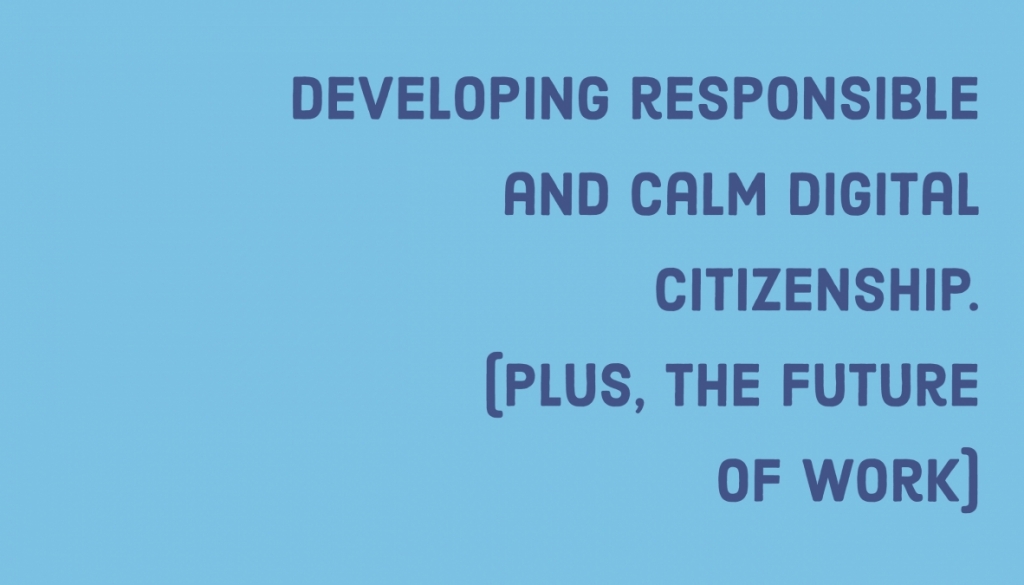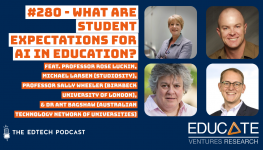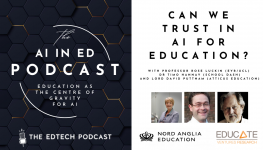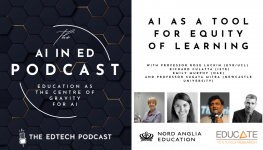#95 – Developing responsible and calm digital citizenship. (Plus, the future of work)

Podcast: Play in new window | Download
Subscribe on iTunes, Stitcher, TuneIn
Welcome to this episode of the Pearson Future Tech for Education Series on The Edtech Podcast. My name is Sophie Bailey and each week I’ll be exploring the challenges and opportunities of future tech for education with contributors from across industry, research and academia.
What’s in this episode?
Melvin Kranzberg, a past Professor of the History of Technology at Georgia Tech, famously said:
“Technology is neither good nor bad; nor is it neutral.”
In this episode we look at how to maintain responsible and calm digital citizenship at a time of screaming headlines, whilst also looking at the necessary ethical and philosophical questions which come with advanced technology. We also review what the future of work might look like, following research conducted by Pearson and Nesta on the future of skills and employment in 2030.
Managing our reaction, interaction, and, ultimately creation with technology. Remember that these are tools. Churchill said ~we shape our buildings, thereafter, they shape us; McLuhan paraphrased him ~we shape our tools, thereafter, they shape us. Now technology is a part of almost every aspect of our lives: buildings can be 3d printed, cars can drive themselves, and algorithms can direct our education. It is essential that we understand how these function and what the implications are of silos and biases. We also look into a changing world of work and how we can best prepare.
People
 Sophie is the founder of the iTunes new and noteworthy, The Edtech Podcast. The mission of The Edtech Podcast is to improve the dialogue between ‘ed’ and ‘tech’ for better innovation, through storytelling. The podcast is downloaded 1500+ times a week, from up to 109 countries with the UK, US & Aus in the top 3. Sophie is a mentor and advisor within the edtech community. If she’s not interviewing a University Lecturer, School Leader, Ex-Angry Bird, NGO, or Investor about education innovation, she’s chasing her three year old around the park or binge-reading Homo Deus.
Sophie is the founder of the iTunes new and noteworthy, The Edtech Podcast. The mission of The Edtech Podcast is to improve the dialogue between ‘ed’ and ‘tech’ for better innovation, through storytelling. The podcast is downloaded 1500+ times a week, from up to 109 countries with the UK, US & Aus in the top 3. Sophie is a mentor and advisor within the edtech community. If she’s not interviewing a University Lecturer, School Leader, Ex-Angry Bird, NGO, or Investor about education innovation, she’s chasing her three year old around the park or binge-reading Homo Deus.

 Heather McGowan is an internationally known speaker, writer and thought leader. McGowan prepares educators and business leaders to most-effectively react to rapid and disruptive changes in education, work, and society. As an innovation strategist, Heather has worked with diverse teams in academia and large corporations to address these challenges. In higher education, she advises presidents to develop expertise and learning agility to prepare graduates for jobs that do not yet exist. She was the architect of the Kanbar College of Design, Engineering, and Commerce at Philadelphia University, the first undergraduate college explicitly focused on innovation. At Becker College she crafted the intellectual construct for the Agile Mindset learning framework. She assists corporate executives in rethinking their business models, teams, and organizational structures to become resilient in changing markets. Her corporate clients range from start-ups to publicly traded, Fortune 500 companies, including Autodesk and BD Medical. Recently, she originated the role of Minister of Culture for Hyperloop Transportation Technologies. McGowan is the co-author and co-editor of the book Disrupt Together: How Teams Consistently Innovate. (Links: LinkedIn, Twitter, www.heathermcgowan.com)
Heather McGowan is an internationally known speaker, writer and thought leader. McGowan prepares educators and business leaders to most-effectively react to rapid and disruptive changes in education, work, and society. As an innovation strategist, Heather has worked with diverse teams in academia and large corporations to address these challenges. In higher education, she advises presidents to develop expertise and learning agility to prepare graduates for jobs that do not yet exist. She was the architect of the Kanbar College of Design, Engineering, and Commerce at Philadelphia University, the first undergraduate college explicitly focused on innovation. At Becker College she crafted the intellectual construct for the Agile Mindset learning framework. She assists corporate executives in rethinking their business models, teams, and organizational structures to become resilient in changing markets. Her corporate clients range from start-ups to publicly traded, Fortune 500 companies, including Autodesk and BD Medical. Recently, she originated the role of Minister of Culture for Hyperloop Transportation Technologies. McGowan is the co-author and co-editor of the book Disrupt Together: How Teams Consistently Innovate. (Links: LinkedIn, Twitter, www.heathermcgowan.com)
Quotes from this episode
Humans, once we figure out how to survive, we thrive. We’re an adaptive species.
We’re not used to making drastic changes in one lifetime
I think in our rush to promote STEM in schools, we’re missing the spirit of what STEM is really was really meant to be. STEM should not just be used as a way to teach a coding language. STEM or STEAM is about teaching creativity and problem solving, even using your hands.
Many jobs will disappear while others will be created. What becomes crucial is to enable the people that have to transition from one side of the market to another, to do so effectively with little disruption and little harm to their welfare.
Many people in the labor market are ill-prepared for the new tech that are coming in. Many jobs are changing, many jobs are in increasing need of being able to master digital tech. We find that about 50% of adults in OECD countries are barely able to use technologies for any simple tasks that their jobs might require.
We find our education systems, in particular adult learning, are particularly bad at filling these gaps. People who need training the most get the least of it.
What is the main worry looking at the future is not that it’ll be a jobless future without anything to do because of the robots taking care of all the jobs, that it could be a future of increasing inequality.
The first thing we need to do is shift expectations from mindsets to skill sets.
References
More reading
- Pearson Future Skills here
- Shift Commission Report here
-
https://www.linkedin.com/pulse/learning-uncertainty-imperative-heather-mcgowan/https://www.linkedin.com/pulse/stop-asking-what-heather-mcgowan/https://www.linkedin.com/pulse/stop-blaming-immigrants-algorithm-heather-mcgowan/
Tell us your story
-
We’d love to hear about innovative technology or approaches you are developing or using in education. Leave your stories in the comments below. Alternately, record a quick free voicemail via speakpipe for inclusion in the next episode. Finally, you can post your thoughts or follow-on links via twitter @podcastedtech @denishurley or via The Edtech Podcast Facebook page.
The Pearson Future Tech for Education Series is produced by The Edtech Podcast and supported by Pearson Education. If you’re interested in the themes that come out of the series, check out more ideas in the “open series” here.



